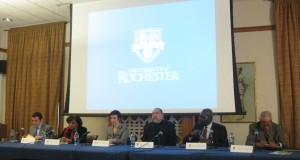It was the question built into the exhibit’s title that struck Director of the Frederick Douglass Institute for African and African-American Studies Cilas Kemedijo: “RACE: Are We So Different?”
As it turned out, the woman behind the exhibit, anthropologist Yolanda Moses, also stood out.
Moses is currently an anthropology professor at the University of California at Riverside and was officially presented with the Frederick Douglass Medal on Wednesday, Feb. 6. at an award ceremony followed by a panel discussion.
The award is sponsored by the Frederick Douglass Institute and has been given to six scholars since its inception in 2008.
“If the question gets asked and is addressed, then we can make progress [toward] making the campus more tolerant and welcoming,” Kemedijo said. “Our hope is that Moses would contribute to a better understanding of race and diversity and get the campus community asking the question.”
Prior to awarding Moses the medal, UR President Joel Seligman highlighted the importance of diversity and the timeliness of the exhibit.
“The notion of diversity as an ultimate test of the ability to welcome people different from we are, to proceed in an atmosphere of mutual respect, the determination to try to empathize with people whose life experiences are very different than [ours] — I think that is among the highest aspirations of this University,” he said.
Seligman said that he wanted to bring good news to the city of Rochester in terms of notable progress in addressing race.
“Human convergence is very much in the air at [UR],” Seligman said.
Noting that the medal is the highest award given by the University for work pertaining to matters of diversity, Seligman said that Moses is “uniquely prepared to address the wide range of differentace perspectives” targeted through the RACE exhibit.
“Like Frederick Douglass, Yolanda Moses has spent a sensational career seeking to understand the rationalizations that buttress racial discrimination in the United States and abroad,” Seligman said.
Moses said that three years of work went into the exhibit.
“I stand in for dozens of people,” she explained. “As it takes a village to raise a child, it took a whole community of interested and dedicated people to put this project together.”
The idea was to find a way to change the national conversation on race such that it was engaging rather than off-putting.
“We know how to talk to each other in academic jargon, but how do we engage the public in a discussion where everyone brought something to the table to talk about — that was our challenge,” Moses said.
The traveling exhibit will be at the Rochester Museum and Science Center until late April. The exhibit’s interactive historical artifacts, graphics, and multimedia make it the first nationally traveling exhibit to “tell the stories of race from biological, cultural, and historical points of view,” according to its website.
Kemedijo also praised Moses for her activism work.
“She combines excellence in scholarship with an acute awareness of its impact on society. Her scholarship and professional leadership are a great testimony to the tradition of social activism that has shaped the development of the field of African-American studies,” he said.
Moses’ current work focuses on the study of diversity and change in universities across the U.S., India, Europe, and South Africa, while much of her prior work focused on gender and class disparities more specific to various societies.
“Racism is the fundamental mechanism of the justification of unjustifiable white privilege in America,” professor of anthropology at the College of William and Mary and panelist Michael Blakey said.
“Natural explanations for racism displaced ideological ones,” he said of anthropology replacing slavery’s justification of race. “We continue to struggle with these bio-deterministic ideas.”
“If we can’t call racism by its name, the obvious existence of racism goes unchallenged,” Blakey said. “We don’t live in a post-racial society, we live in a state of denial.”
Action for a Better Community in Rochester CEO James Norman, also a panelist, said that he believes social justice is bound to economic and political justice and means a world where there is recognition that “something has to be done to reconcile past injustices.”
Norman summed up the reason he believes in the pursuit of social justice with a quote from Frederick Douglass: “If there is no struggle, there is no progress.”
Additional reporting by Melissa Goldin, class of 2013.
Buletti is a member of the class of 2013.





